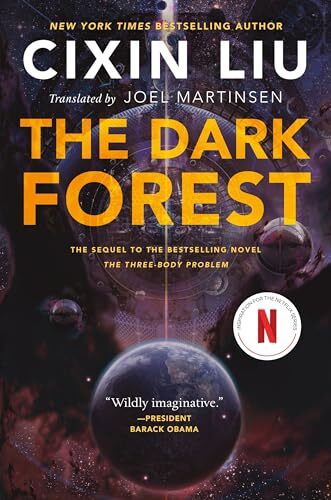
The Three Body Problem had a few very creative sci-fi ideas and one awesome character, but the other characters were flat, and the writing (or possibly, the translation) was poor. The Dark Forest amps up this formula to new heights: you get a huge number of new, original, memorable sci-fi ideas, one more fun character, and better writing. In other words, if you enjoyed the first book even a little, you’ll enjoy this one a lot more.
Some of my favorite ideas from this book series:
(spoiler alert)
-
Sophons: A computer built by unfolding into 11-dimensional space and then folding down into 2-dimensions to create a tiny, subatomic particle. I love the idea that because these particles can travel at the speed of light, they can effectively visit every point on earth, repeatedly, and observe and manipulate events everywhere. Just like a computer, being able to do something extremely quickly can create some amazing illusions.
-
Nanowires: Extremely strong, but microscopically small wires that are able to cut through anything. The scene with these in the first book is something you’ll never forget.
-
Wallbreakers: Humans granted special powers by the UN to protect humans from the Trisolarans by formulating secret plans, known only to themselves. With the Sophons, the Trisolarans can observe just about everything—except the contents of the mind.
-
DNA-targeted viruses: Diseases that infect and spread through everyone, but cause negative effects in only a specific target person.
-
Mental Seal: A device that can implant an idea in someone’s mind that the person considers absolutely true, despite evidence to the contrary.
-
The droplet: A device sent by the Trisolarans that seems to be made of metal and in the form of a perfectly reflective water droplet. It is at absolute zero and completely uniform and flat, even under thousands of levels of magnification. It turns out that it is built from matter bonded together using the strong interaction force, making the droplet nearly indestructible. The scene where the humans discover the droplet and find out what it can do is epic.
-
The Dark Forest: Like hunters in a dark forest, life can never be certain of alien life’s true intentions. The extreme distance between stars creates an insurmountable “chain of suspicion” where any two civilizations cannot communicate well enough to relieve mistrust, making conflict inevitable. Therefore, it is in every civilization’s best interest to preemptively strike any developing civilization before it can become a threat, but without revealing their own location, thus solving the Fermi paradox.
Quotes
Some great quotes from the book:
The universe is a dark forest. Every civilization is an armed hunter stalking through the trees like a ghost, gently pushing aside branches that block the path and trying to tread without sound. Even breathing is done with care. The hunter has to be careful, because everywhere in the forest are stealthy hunters like him. If he finds other life—another hunter, an angel or a demon, a delicate infant or a tottering old man, a fairy or a demigod—there’s only one thing he can do: open fire and eliminate them. In this forest, hell is other people. An eternal threat that any life that exposes its own existence will be swiftly wiped out. This is the picture of cosmic civilization. It’s the explanation for the Fermi Paradox.
For the majority of people, what they love exists only in the imagination. The object of their love is not the man or woman of reality, but what he or she is like in their imagination. The person in reality is just a template used for the creation of this dream lover. Eventually, they find out the differences between their dream lover and the template. If they can get used to those differences, then they can be together. If not, they split up. It’s as simple as that.
The past was like a handful of sand you thought you were squeezing tightly, but which had already run out through the cracks between your fingers. Memory was a river that had run dry long ago, leaving only scattered gravel in a lifeless riverbed. He had lived life always looking out for the next thing, and whenever he had gained, he had also lost, leaving him with little in the end.
